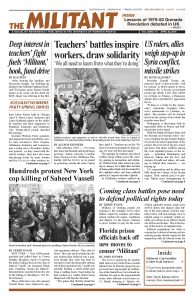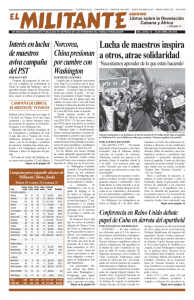LONDON — “No, I did not murder Maurice Bishop. No, I did not order his death,” said Bernard Coard in opening his talk to a March 27 meeting here.
Coard was trying to rationalize his treacherous leadership 35 years ago of the bloody overthrow of a mighty revolution that had opened on March 13, 1979, on the small Eastern Caribbean island of Grenada. Maurice Bishop was the central leader of the revolution and prime minister of the workers and farmers government it brought to power.
The Grenada Revolution, said Fidel Castro, along with the Nicaraguan Revolution of July 1979, joined Cuba as one of the “three giants” in the Caribbean on the very doorstep of imperialism.”
But four years later the revolution was destroyed in a coup led by Coard, the deputy prime minister and organizer of a Stalinist faction in the governing party, the New Jewel Movement. Bishop, other New Jewel leaders, and the majority of Grenada’s working people rose up to turn back the counterrevolution.
Audience challenges Coard’s lies
Murmurs of “lies” and “counterrevolutionary” could be heard from participants as Coard claimed the revolution had “imploded.” It was a “tragedy,” he said, for which “we were all responsible. We all made errors.”
The Grenada revolution’s significance for working people today, along with Coard’s self-serving assessment, were sharply debated at the “Audience with Bernard Coard,” as the event was billed.
“The Grenadian people launched an uprising to free Bishop from house arrest and restore their government to power,” Ólof Andra Proppé told the meeting during the discussion.
“Troops loyal to Coard, turned their guns on a mass demonstration on Oct. 19, 1983,” she said. “They assassinated Bishop and five other revolutionary leaders — Fitzroy and Norris Bain, Jacqueline Creft, Vincent Noel and Unison Whiteman. They killed or wounded many others in the crowd. Coard’s forces then unleashed a bloody reign of terror, including a four-day, round-the-clock, shoot-to-kill curfew imposed on the entire population,”
Proppé, who explained she was a member of the Communist League, got applause. There were a number of Grenadians in the audience who knew the real story of the revolution and Coard’s counterrevolutionary betrayal. The overthrow of the revolution opened the door for Washington to invade a week later.
Proppé held up copies of Maurice Bishop Speaks and New International no. 6 with the article “The Second Assassination of Maurice Bishop” by Steve Clark, a leader of the U.S. Socialist Workers Party. “In these books you can learn the real record of the Grenadian Revolution and Coard’s role in its overthrow,” she said.
“She speaks for me,” said Gale Jerome George, originally from Grenada, who spoke next. “I felt I had to come to this meeting despite this being an emotional issue for me. I was very young at the time. Other Grenadian friends of mine felt they couldn’t come.”
“I wanted to know what you had to say,” she said, addressing Coard. “Now that I’ve heard your ‘there’s-blame-on-all-sides’ view, I see it’s to try to excuse you of blame. It doesn’t wash. Why was Bishop placed under house arrest? Where are the bodies?” George was referring to the fact that the bodies of Bishop and other slain leaders were removed and never recovered.
Others who spoke from the floor also defended Bishop and the revolution. “You talk about collective responsibility,” said Natasha. “What was your responsibility?”
The March 27 event was the last of a two-week U.K. book tour for Coard to promote his recently published, The Grenada Revolution: What Really Happened? The book, which Coard said is the first of five volumes, is pushed as a “must-read” by the Morning Star, the daily newspaper associated with the Communist Party of Britain. Morning Star supporters were sponsors of several book tour events.
The tour began with a book launch at the headquarters of the National Education Union. The March 27 meeting was held in the offices of the Unite Union’s London and Eastern Region, jointly sponsored by Caribbean Labour Solidarity and the union’s regional Black and Ethnic Minorities Committee.
In a letter to Unite Regional Secretary Peter Kavanagh, union member Hugh Robertson urged that the “regional committee and all union members condemn the event.” Robertson is a Lineside production worker at the Ford engine plant in Dagenham and the Communist League candidate for Plaistow South in the London Borough of Newham in May 3 local elections.
Robertson circulated his letter at the meeting, quoting Bishop that the “great strength of the revolution, first and foremost, lies in the unbreakable link between the masses and the party; between the masses and the government; between the masses and the state.” He contrasted this to the Coard faction’s counterrevolutionary contempt for working people, reflected in Coard’s condemnation of what he called the “herd psychology” of a large crowd — referring to the massive Oct. 19 popular mobilization to free Bishop.
For Coard “the exploited producers in city and countryside were not the subjects of revolutionary social change, not its makers but instead the objects of policy by an administrative apparatus,” Steve Clark explains in the “Second Assassination of Maurice Bishop.” The title refers to how Coard and his backers lied and slandered Bishop both before and after they had him killed. Coard’s new book and public talks continue that slander.
Opened way for imperialism
Coard was joined on the platform by Alan Scott, secretary of the misnamed Committee for Human Rights in Grenada. For years the committee has campaigned in support of Coard under the banner of opposing his imprisonment by the U.S.-imposed regime following Washington’s invasion.
Coard’s political supporters use this 26-year imprisonment to try to garner sympathy for his political course, especially from people who know little about the revolution and its overthrow.
Also on the platform was Dennis Bartholomew, who worked in the Grenada High Commission in London during the revolution. He is a leader of Caribbean Labour Solidarity and co-author of By Our Own Hands — A People’s History of the Grenadian Revolution, an apology for Coard’s political course.
Although directly challenged about the four-day shoot-to-kill curfew, Coard never addressed it. Instead, he sought to deflect a real exchange, charging that those who did not share his view were “echoing the imperialist narrative.”
Was Fidel Castro “echoing the imperialist narrative?” this reporter asked from the floor. At a rally of more than 1 million people in Havana to honor Cuban internationalist construction workers killed during the U.S. invasion, the Cuban leader said that Coard’s “Pol Pot-type group that murdered [Bishop] would never have been forgiven” by the Grenadian people. The counterrevolution handed Grenada to Washington on a silver platter, Castro said.
Coard, in his summary remarks, tried to get off the hook by absurdly claiming there had been no political differences between him and Bishop. And Castro later changed his mind, Coard said (citing no evidence, since Castro never said any such thing).
“I support Bernard’s view of what happened,” Bartholomew said, “and encourage you to buy his book.”
But Bartholomew had to acknowledge those who challenged Coard. “You can also buy ‘The Second Assassination of Maurice Bishop’ and make up your own minds,” he said. Five people did so, and others who didn’t have money placed orders. Seventy-five copies of it have been sold in recent years in the U.K.

